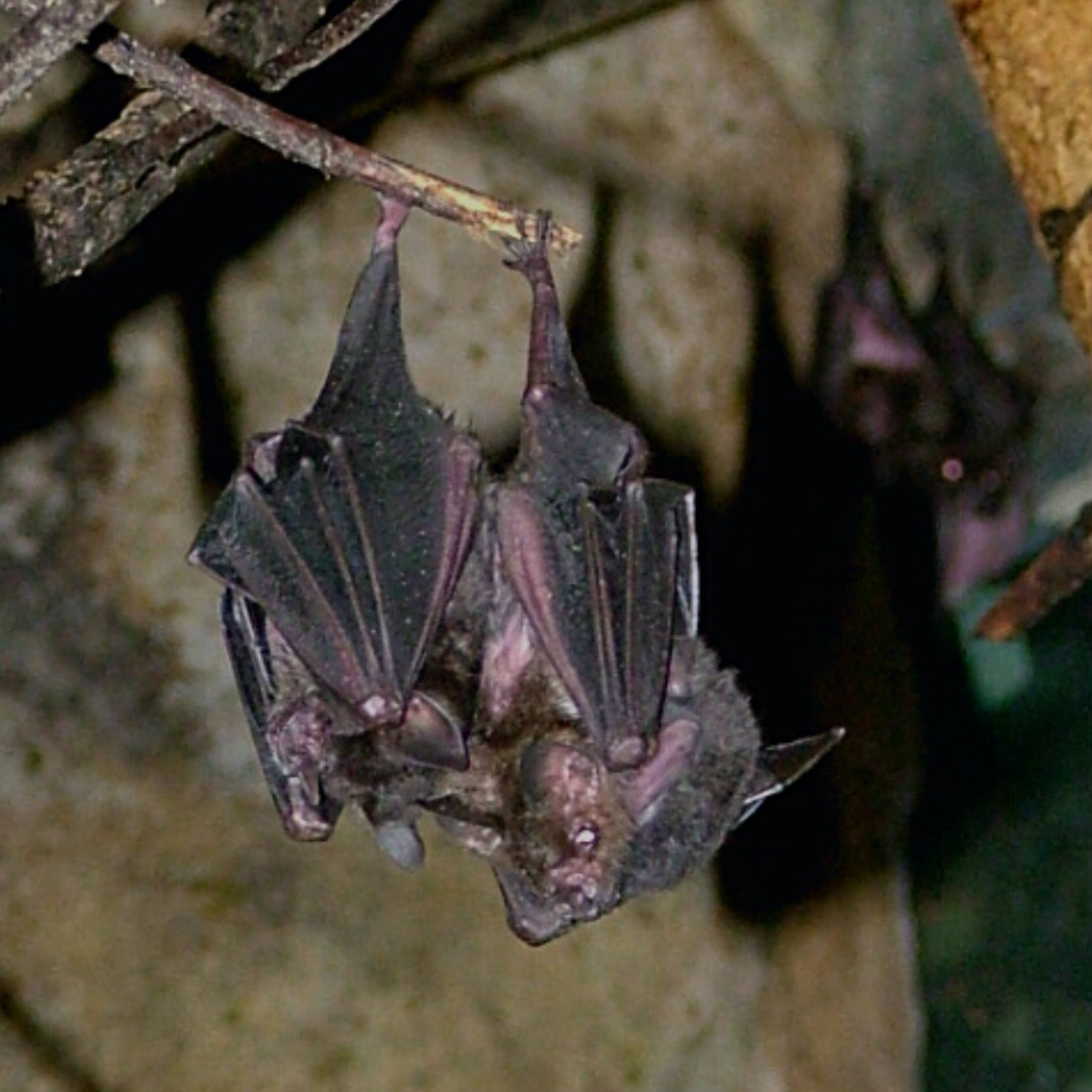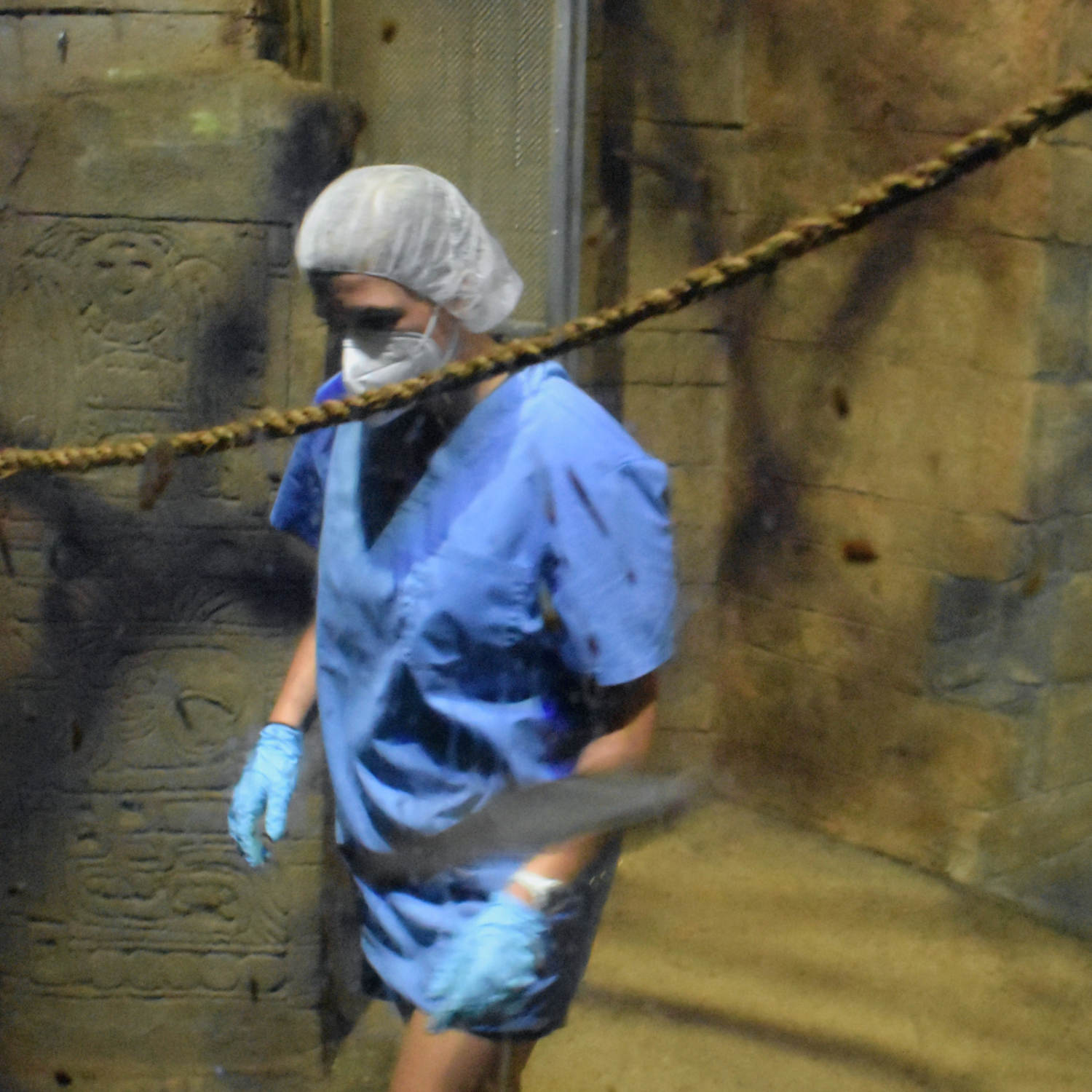Every year since 1997, more than 30 countries around the world have celebrated International Bat Night during the last weekend of August. This holiday aims to teach people about a wide variety of bat species while helping them to better understand the importance of bats in our ecosystem. Today, there are more than 1,400 species of bats worldwide. These bats can be found in all shapes and sizes, from the golden-crowned flying fox, who has a wingspan of over five feet, to the Kitti's hog-nosed bat, the smallest mammal in the world by length. However, you don't need to travel the globe to see amazing bats - you can meet several unique species right here at your Akron Zoo!
The Akron Zoo is currently home to three species of bats: Seba's short-tailed bats, Rodrigues fruit bats and straw-colored fruit bats. All three of these species are nocturnal and have specific environmental needs in order to stay happy and healthy. Our expert keepers take great care to meet all of these needs while also encouraging the bats to be most active while guests are visiting.
 "Every bat species has specific temperature and humidity parameters," says Elizabeth Maille, the Akron Zoo's primary Seba's short-tailed bat keeper. "As keepers, we regularly check their environment to make sure it is comfortable and as closely related to the conditions in their native habitat as possible. We also have both of our bat habitats on a reverse light cycle, which means that habitat lights are on timers which are specifically programmed to stay dimmed during the daylight hours and turn on at night. This allows our guests to have an opportunity to see the bats when they would be the most active."
"Every bat species has specific temperature and humidity parameters," says Elizabeth Maille, the Akron Zoo's primary Seba's short-tailed bat keeper. "As keepers, we regularly check their environment to make sure it is comfortable and as closely related to the conditions in their native habitat as possible. We also have both of our bat habitats on a reverse light cycle, which means that habitat lights are on timers which are specifically programmed to stay dimmed during the daylight hours and turn on at night. This allows our guests to have an opportunity to see the bats when they would be the most active."
Not only do our bats have specific environmental needs - they also have a huge appetite! Seba’s short-tailed bats are opportunistic frugivores, meaning they eat a wide variety of overripe fruits. Since flying burns a lot of calories, each individual eats up to two times their own body weight every day to maintain their energy! The Akron Zoo is home to more than 600 of these little guys, so we are constantly ordering fresh fruit to keep them well fed. In fact, our bats are the most expensive animals to feed in the whole zoo!
"All of our bats are fruit-eaters, so their base diet is a mix of dry pellet diet, fruit, veggies and fruit juice. For our Seba's bats, we split their diet in half and feed it out over the course of the day," says Maille. "We can also offer them additional fruits and veggies hung up in the habitat for enrichment. Some of our Seba's bats' favorite enrichment is definitely bunches of grapes, bananas, apples and melon. They will land on pieces of fruit in large groups, sometimes to the point of completely covering its surface! I especially love hand-feeding them bananas, because when I will walk into the habitat with the banana in my hand, they immediately start swarming and landing on it."
However, it's not all feeding and fun - bat keeping can be hard work.
 "Keepers clean the Seba's entire habitat every day," says Maille. "Cleaning starts by hosing down the whole habitat while being very careful not to spray any bats. Once the habitat has been fully rinsed, we spray the habitat with soap and scrub the floor, windows, walls and other surfaces before rinsing everything one last time."
"Keepers clean the Seba's entire habitat every day," says Maille. "Cleaning starts by hosing down the whole habitat while being very careful not to spray any bats. Once the habitat has been fully rinsed, we spray the habitat with soap and scrub the floor, windows, walls and other surfaces before rinsing everything one last time."
This is hard work, but it is completely worthwhile in the name of species conservation! We love every bat that calls the Akron Zoo home. Unfortunately, many bat species around the world are on the decline due to disease, deforestation, predation and extermination. People in many countries believe that bats represent some type of evil, or incorrectly believe them to be vampire bats, resulting in bat colonies being eradicated in massive numbers. Today, the IUCN considers roughly one-third of bat species to be threatened or not sufficiently studied. In reality, bats are highly beneficial!
"The bats we have here at the zoo are the representatives for their conspecifics in the wild," says Maille. "Bats are actually very important plant pollinators, seed-distributers and pest controllers in their native habitats. Our native Ohio bats, for example, will eat mosquitos, destructive beetles, flies, moths and many other pest species."
So what can we do to celebrate International Bat Night? One option is to build a bat box. Bat boxes give bats a place to sleep while also providing natural pest control for your yard! You can also donate to organizations who contribute to bat conservation, or visit bats at the Akron Zoo! A portion of every ticket purchased helps us to provide high-quality care (and lots and lots of food) for our animals, such as the Seba's short-tailed bats! Thank you for your support and we hope to see you soon!
By Erica Rymer, PR Coordinator. Published Aug. 27, 2022.
